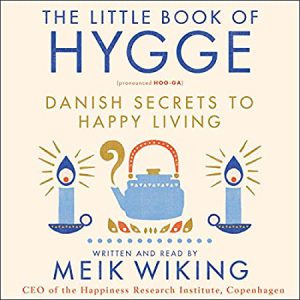This past weekend I listened to The Little Book of Hygge: Danish Secrets to Happy Living, by Meik Wiking (duration: approximately three hours). Wiking, CEO of the Happiness Research Institute in Copenhagen, Denmark, narrates with a delightful Danish accent.
You’ve probably heard at least a passing reference to the Danish word hygge (pronounced HOO-GA). According to a blurb on the back cover of the book’s print edition, hygge “loosely translates as a sense of comfort, togetherness, and well-being.” You may even have read an article about hygge—they proliferated during the pandemic when people were struggling with how to feel better about being stuck at home. But according to my new understanding, spending time consuming a whole book about hygge is definitely more hyggelig (the adjectival form of hygge) than spending 5 minutes scanning an article about it!
Wiking spends a lot of time talking about what is and isn’t hygge. Candles and low lighting are hygge. Wool socks and blankets are hygge. Cake, coffee, and chocolate are hygge. Cooking and eating a meal with friends at home is hygge. Bling and boastfulness, on the other hand, aren’t hygge. The idea that “bigger is better” isn’t hygge. And neither is champagne and oysters at a fancy restaurant.
At its most basic level, hygge is about relishing simple, everyday pleasures, especially in the company of close friends and family. The fact that this practice contributes to happiness isn’t an earthshattering revelation, so why do the Danes seem so much better at it than other nationalities? According to Wiking, “What might also be unique for Denmark when it comes to hygge is how much we talk about it, focus on it, and consider it as a defining feature of our cultural identity and an integral part of the national DNA. In other words, what freedom is to Americans, thoroughness to Germans, and the stiff upper lip to the British, hygge is to Danes.”
The intentionality with which Danes approach hygge is undoubtedly one reason Denmark consistently ranks among the happiest nations in the world. But Wiking also points to policy factors, including a good work-life balance and the welfare state, which “reduces uncertainty, worries, and stress in the population.”
Policy change, while worthwhile, is hard and takes time. Hygge, on the other hand, is easy and accessible to all of us if we are so inclined. So if you’ve been feeling stressed, overwhelmed, and unhappy, plan intentionally for a hyggelig evening sometime soon. And if you want to learn more about why Danes are among the happiest people in the world, consider reading or listening to The Little Book of Hygge.
Wiking, Meik. The Little Book of Hygge: Danish Secrets to Happy Living. HarperAudio, 2017.


